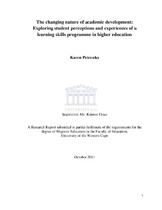| dc.description.abstract | In this paper, I focus on the issue of student perceptions and experiences of a 3rd generation academic development programme in higher education. I set out to explore the issue from two perspectives: firstly from the perspective of the higher education institution’s approach to academic development, namely, a learning skills programme and a first year sociology course, and secondly from the perspective of students’ intentions, expectations and experiences of such a programme. The research questions focused on the learning priorities embedded in the curriculum of a learning skills programme at Monash University, South Africa and the learning experiences of students in this programme.The methodology used in this study includes a case study which focused on the responses of six participants from a number of African countries completing their BA degrees. Semistructured interviews held and the content analysis method was used to analyse the data.
The study concludes: that the main priority of the learning skills programme is to prepare students for their university learning rather than to prepare students for the world of work i.e. it falls within Street’s (2004) academic socialization model and that the Learning Skills programme can be seen as an example of Boughey’s (2007) 3rd generation academic development programmes.The study also suggests that there is a need to explore Volbrecht’s (2003) argument on the
limitations of discipline-based models of academic development, the need to examine how academic literacy is constructed and how identity and power relations intersect in this construction. It further highlights the importance of the idea of multi-literacies as put forward by Street (2004) and suggests that as practitioners we should include a consideration of these literacies in academic development programmes to improve the quality of students’ learning and meaning making. | en_US |

